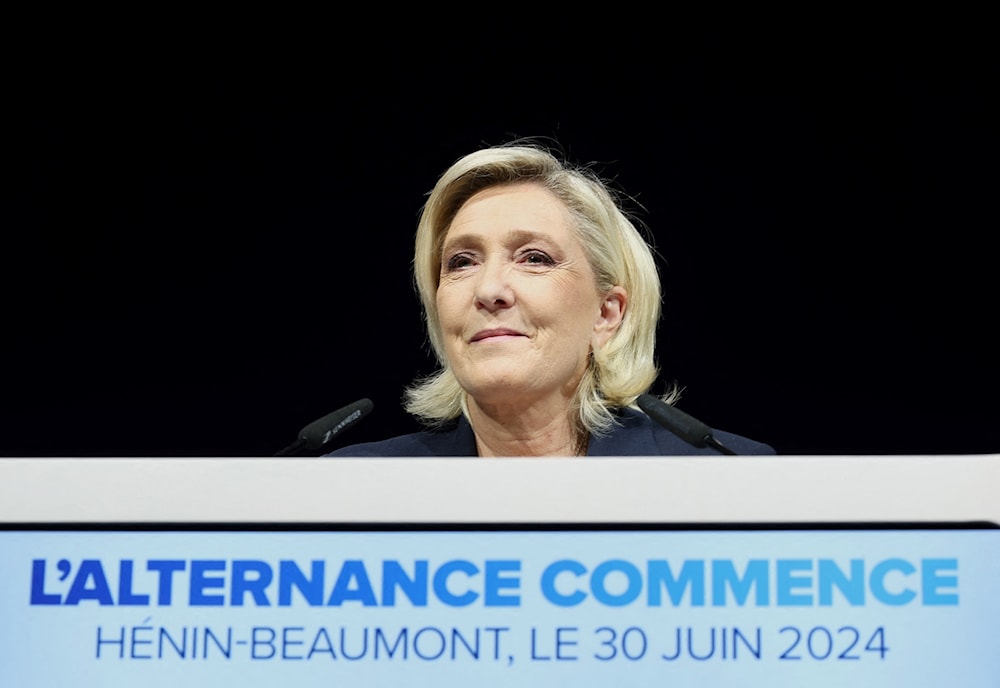French far-right wins first round of legislative elections: Pollsters
French President Emmanuel Macron calls for a "broad" alliance against the far right in the legislative elections' second round.
-

Former president of the French far-right Rassemblement National (RN) parliamentary group Marine Le Pen gives a speech during the results evening of the first round of the parliamentary elections in Henin-Beaumont, northern France, on June 30, 2024. (AFP)
France's far-right emerged Sunday victorious in the first round of pivotal legislative elections, with President Emmanuel Macron's centrist forces trailing in third place behind the left, following the highest voter turnout in over four decades, according to estimates.
However, it remains uncertain whether Marine Le Pen's far-right National Rally (RN) party will secure an absolute majority in the new National Assembly in the July 7 second round and secure the prime minister's position.
Macron had called for snap elections after the RN overwhelmingly defeated his centrist forces in the European Parliament elections earlier this month.
This move risks backfiring, as Macron's alliance is now expected to secure a much smaller minority in parliament, reducing the President's power significantly for the remaining three years of his term.
Reuters cited pollsters IFOP, Ipsos, OpinionWay, and Elabe as saying that the RN is projected to lead the first round of elections with approximately 34% of the votes, while the leftwing New Popular Front (NFP) coalition is expected to come in second with around 29%, followed by Macron's centrist bloc, which is estimated to secure between 20.5% and 23%.
Elabe, in an estimate for BFM TV, suggested that the National Rally and its allies could win between 260 and 310 seats in the National Assembly in the second voting round on July 7. Meanwhile, Ipsos projected a range of 230 to 280 seats for RN and its allies in a poll for France Television.
To achieve an absolute majority in the National Assembly, which is France's lower house of parliament, a total of 289 seats is required.
Other leading French polling firms gave the RN 34.5% of the vote, compared to 28.5-29.1% for the left-wing New Popular Front alliance and 20.5-21.5% for Macron's centrist camp.
The polling firms projected that this could grant the RN a majority of seats in the 577-seat National Assembly after the second round, with a potential for an absolute majority.
In a statement, Macron called for a "broad" alliance against the far right in the legislative elections' second round.
Faced with their most polarizing choices in recent history, French voter turnout soared. The Elabe organization projected a final turnout of 67.5%, the highest participation in a regular legislative election in France since 1981.
The final turnout in 2022 was just 47.5%.
The July 7 second round will feature run-off votes in constituencies where no candidate achieved an absolute majority, determining the final composition of the National Assembly.
This two-round vote could potentially bring the far-right to power in France for the first time since the Nazi occupation during World War II, allowing 28-year-old RN party chief Jordan Bardella to form a government.
Bardella has stated that he will only form a government if his RN wins an absolute majority.
In the French Pacific territory of New Caledonia, where tensions have been high following deadly protests last month, voter turnout stood at 60% compared to 32.5% during the 2022 legislative polls.
Read more: Explainer: How French parliamentary elections work?

 3 Min Read
3 Min Read








